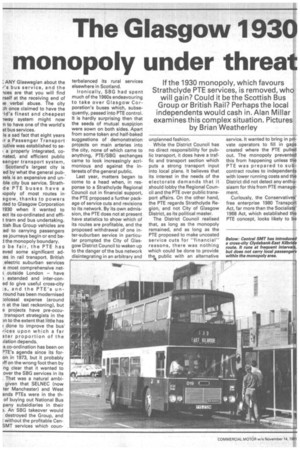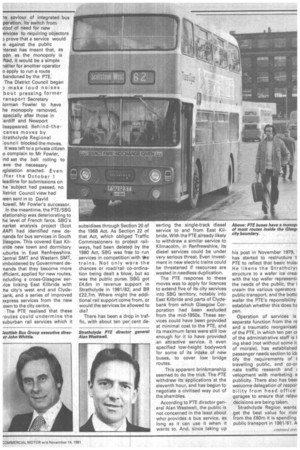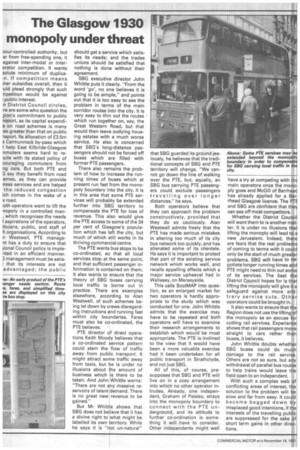• The Glasgow 1930 monopoly under threat
Page 76

Page 77

Page 78

If you've noticed an error in this article please click here to report it so we can fix it.
If the 1930 monopoly, which favours Strathclyde PTE services, is removed, who will gain? Could it be the Scottish Bus Group or British Rail? Perhaps the local independents would cash in. Alan Millar examines this complex situation. Pictures by Brian Weatherley
ANY Glaswegian about the o's bus service, and the ices are that you will find rself at the receiving end of le verbal abuse. The city ;h once claimed to have the • Id's finest and cheapest 'way system might now 11 to have one of the world's St bus services.
is a sad fact that eight years Ir a Passenger Transport ;utive was established to se: a properly integrated, conated, and efficient public senger transport system, Scotland's largest city is ed by what the general pub-. ?.els is an expensive and unble city bus service. Strathde PTE buses have a topoly of most routes in sgow, thanks to powers ited to Glasgow Corporation 1930 when it wanted to ect its co-ordinated and effit tram and bus undertaking. :tish Bus Group vehicles are :ed to carrying passengers se journeys begin or end beI the monopoly boundary.
o be fair, the PTE has eyed some significant ad;es in rail transport. British electric suburban services e most comprehensive net( outside London — have ) extended and inter-coned to give useful cross-city :s, and the PTE's unround has been modernised :olossal expense (around n at the last reckoning), but
e projects have pre-occutransport strategists in the )n to the extent that little has I done to improve the bus' 'ices upon which a far 3 ter proportion of the ilation depends.
s co-ordination has been on PTE's agenda since its foron in 1973, but it probably )ff on the wrong foot then by ng clear that it wanted to over the SBG services in its . That was a natural ambigiven that SELNEC (now ter Manchester) and West ands PTEs were in the thof buying out National Bus pany subsidiaries in their 3. An SBG takeover would destroyed the Group, and : without the profitable CenSMT services which coun
terbalanced its rural services elsewhere in Scotland.
Ironically, SBG had spent much of the 1960s endeavouring to take over Glasgow Corporation's buses which, subsequently, passed into PTE control. It is hardly surprising then that the seeds of mutual sus*ion were sown on both sides. Apart from some token and half-baked suggestions of demonstration projects on main arteries into the city, none of which came to anything, PTE/SBG exchanges came to look increasingly acrimonious and against the interests of the general public.
Last year, matters began to come to a head when, in response to a Strathclyde Regional Council cut in financial support, the PTE proposed a further package of service cuts and revisions to its network. By its own admission, the PTE does not at present have statistics to show which of its routes are profitable, and the proposed withdrawal of one inter-suburban service in particular prompted the City of Glasgow District Council to waken up to the danger of the bus network disintegrating in an arbitrary and unplanned fashion.
While the District Council has no direct responsibility for public transport, it does have a traffic and transport section which puts a strong transport input into local plans. It believes that its interest in the needs of the electorate demands that it should lobby the Regional Council and the PTE over public transport affairs. On the other hand, the PTE regards Strathclyde Region, and not City of Glasgow District, as its political master.
The District Council realised that, as long as the monopoly remained, and as long as the PTE proposed to make uncosted service cuts for "financial' reasons, there was nothing which could be done to provide the public with an alternative service. It wanted to bring in private operators to fill in gaps created where the PTE pulled out. The monopoly prevented this from happening unless the PTE was prepared to subcontract routes to independents with lower running costs and the District did not detect any enthusiasm for this from PTE management.
Curiously, the Conservatives' free enterprise 1980 Transport Act, far more than the Socialists' 1968 Act, which established the PTE concept, looks likely to be le saviour of integrated bus peration. Its switch from 'roof of need for new ervices to requiring objectors prove that a service would e against the public iterest has meant that, as oon as the monopoly is Ifted, it would be a simple latter for another operator o apply to run a route bandoned by the PTE: The District Council began make loud noises bout pressing former r a nsp ort Secretary lorman Fowler to have he monopoly removed, specially after those in :ardiff and Newport lisappeared. Beh i n d -t h ece n e s moves by 1trathclyde Regional :ouncil blocked the moves. It was left to a private citizen o complain to Mr Fowler, Ind set the ball rolling to ave the necessary 3gislation enacted. Even fter the October 1 leadline for submissions on he 'subject had passed, no )istrict Council view had )een sent in to David
lowell, Mr Fowler's successor. In the meantime, the PTE/SBG elationship was deteriorating to he level of French farce. SBG's narket analysis project (Scot AAP) had identified new denands for bus services in South 3Iasgow. This covered East Kuride new town and dormitory ;uburbs in East Renfrewshire. :entral SMT and Western SMT, rmboldened by Government denands that they become more )fficient, applied for new routes, ncluding a cross-Glasgow serlice linking East Kilbride with he city's west end and ClydeDank, and a series of improved 3xpress services from the new :own to the city centre.
The PTE realised that these routes could undermine the 5uburban rail services which it subsidises through Section 20 of the 1968 Act. As Section 22 of that Act, which obliged Traffic Commissioners to protect railways, had been deletepl by the 1980 Act, SBG was frele to run services in competition with the trains. Not only w re the chances or road/rail c• -ordination being dealt a blo , but so was the public purse. BG got £4.6m in revenue su port in Strathclyde in 1981/82, and BR £22.7m. Where might the additional rail support come from, or would the services be allowed to die?
There has been a dr p in traffic, with about ten per cent de serting the single-track diesel service to and from East Kilbride. With the PTE already likely to withdraw a similar service to Kilmacolm, in Renfrewshire, its diesel services could be under very serious threat. Even investment in new electric trains could be threatened if resources are wasted in needless duplication.
The PTE response to these moves was to apply for licences to extend five of its city services into SBG territory, notably into East Kilbride and parts of Clydebank from which Glasgow Corporation had been excluded from the mid-1950s. These services could have been provided at minimal cost to the PTE, and its maximum fares were still low enough for it to have provided an attractive service. It even specified low-height bodywork for some of its intake of new buses, to cover low bridge routes.
This apparent brinkmanship seemed to do the trick. The PTE withdrew its applications at the eleventh hour, and has begun to negotiate a civilised way out of the shambles.
According to PTE director general Alan Westwell, the public is not concerned in the least about who provides a bus service, as long as it can use it when it wants to. And, since taking up his post in November 1979, has started to restructure t PTE to reflect that basic truisi He likens the Strathcly( structure to a wafer ice crew with the top wafer representii the needs of the public, the i cream the various operators public transport, and the bottc wafer the PTE's reponsibility establish whether this does he pen.
Operation of services is separate function from the re and a traumatic reorganisati of the PTE, in which ten per CE of the administrative staff is t ing shed (not without some lc of morale), has established passenger needs section to id( tify the requirements of t travelling public, and co-or nate traffic research and velopment with marketing a publicity. There also has beer welcome delegation of respoibility from head office garages to ensure that relevi decisions are being taken.
Strathclyde Region wants get the best value for mor from the £60m it is spending public transport in 1981/81. A aour-controlled authority, but ar from free-spending one, it against inter-modal or intererator competition. It wants 5olute minimum of duplicain. If competition means lher subsidies overall, then it uld plead strongly that such ',petition would be against public interest.
n District Council circles, ire are some who question the gion's commitment to public nsport, as its capital expendi
e on road schemes is many ies greater than that on public nsport. Its allocation of £3.5m 3 Carmunnock by-pass which
help East Ki!bride-Glasgow nmuters seems hard to reicile with its stated policy of couraging commuters from ng cars. But both PTE and G say they benefit from road emes, as they can provide wess services and are helped the reduced congestion ich comes in the wake of a v road.
ioth operators want to lift the nopoly in a controlled man, which recognises the needs I aspirations of the operators, iticians, public, and staff of h organisations. According to n Westwell, PTE managent has a duty to ensure that lion& Council policy is implented in an efficient manner. 3 management must be satis that its interests are not advantaged; the public should get a service which satisfies its needs; and the trades unions should be satisfied that nothing is done without their agreement.
SBG executive director John Whittle puts it clearly. "From the word 'go', no one believes it is going to be simple," and points out that it is too easy to see the problem in terms of the main corridor routes into the city. It is very easy to thin out the routes which run together on, say, the Great Western Road, but that would then leave outlying housing estates with a much worse service. He also is concerned that SBG's long-distance passengers should not be forced off buses which are filled with former PTE passengers.
There also remains the problem of how to increase the running times of buses which at present run fast from the monopoly boundary into the city. It is in this area that some PTE services will probably be extended further into SBG territory to compensate the PTE for loss of revenue. This also would give the PTE access to some of the 34 per cent of Glasgow's population which has left the city, but much of which still works in its thriving commercial centre.
The PTE wants bus stops to be co-ordinated, so that all local services stop at the same point, and that sufficient passenger information is contained on them. It also wants to ensure that the theory of SBG buses carrying local traffic is borne out in practice. There are examples elsewhere, according to Alan Westwell, of such schemes being let down by crews disregarding instructions and running fast within city boundaries. Fares must also be co-ordinated, the PTE believes.
PTE director of direct operations Keith Moody believes that a co-ordinated service pattern could stem the flow of traffic away from public transport. It might attract some traffic away from taxis, but he is under no illusions about the amount of business which is there to be taken. And John Whittle warns: "There are not any massive reservoirs of latent demand. There is no great new revenue to be gained."
But Mr Whittle shows that SBG does not believe that it has a divine right to what might be labelled its own territory. While he says it is "not un-natural" that SBG guarded its ground jealously, he believes that the traditional concepts of SBG and PTE territory will change. "We cannot go down the line of walking over the PTE, but, equally, an SBG bus carrying PTE passengers could exclude passengers travelling over longer distances," he says.
Both operators believe that they can approach the problem constructively, provided that they do so cautiously. Alan Westwell admits freely that the PTE has made serious mistakes in altering too much of its city bus network too quickly, and has alienated some of its clientele. He says it is important to protect that part of the existing service network which works well, and recalls appalling effects which a major service upheaval had in Wallasey, on Merseyside.
This calls ScotMAP into question, as an enlarged market for two operators is hardly appropriate to the study which was conducted for one. John Whittle admits that the exercise may have to be repeated and both operators will have to examine their research arrangements to establish which would be most appropriate. The PTE is inclined to the view that it would have been a more valuable exercise had it been undertaken for all public transport in Strathclyde, and not just SBG.
All of this, of course, presupposes that SBG and PTE will live on in a cosy arrangement into which no other operator intrudes. Already, one independent, Graham of Paisley, strays into the monopoly boundary to connect with the PTE underground, and its attitude to further co-ordination is something it will have to consider. Other independents might well have a try at competing with thE main operators once the mono ply goes and McGill of Barrhead has already applied for a Barrhead Glasgow licence. The PTE and SBG are confident that they can see off most competitors.
Whether the District Council will want them to is another matter. It is under no illusions that lifting the monoply will lead to a new Jerusalem. Indeed, there are fears that the real problems of coming to terms with it could only be the start of much greater problems. SBG will have to negotiate longer running times and PTE might need to thin out some of its services. The best the District Council hopes for is that lifting the monopoly will give it a safeguard against more arbitrary service cuts. Other operators could be brought in.
It also wants to ensure that the Region does not use the lifting of the monopoly as an excuse for cutting rail services. Experience shows that rail passengers move straight to cars rather than buses, it believes.
John Whittle doubts whether SBG buses could do much damage to the rail service. Others are not so sure, but any withdrawal of parallel bus routes to help trains would leave the field open to an independent.
With such a complex web of conflicting areas of interest, the solution to the problem will be slow and far from easy. It could become bogged down by misplaced good intentions, if the interests of the travelling public are suppressed for the sake of short term gains in other directions.






















































































